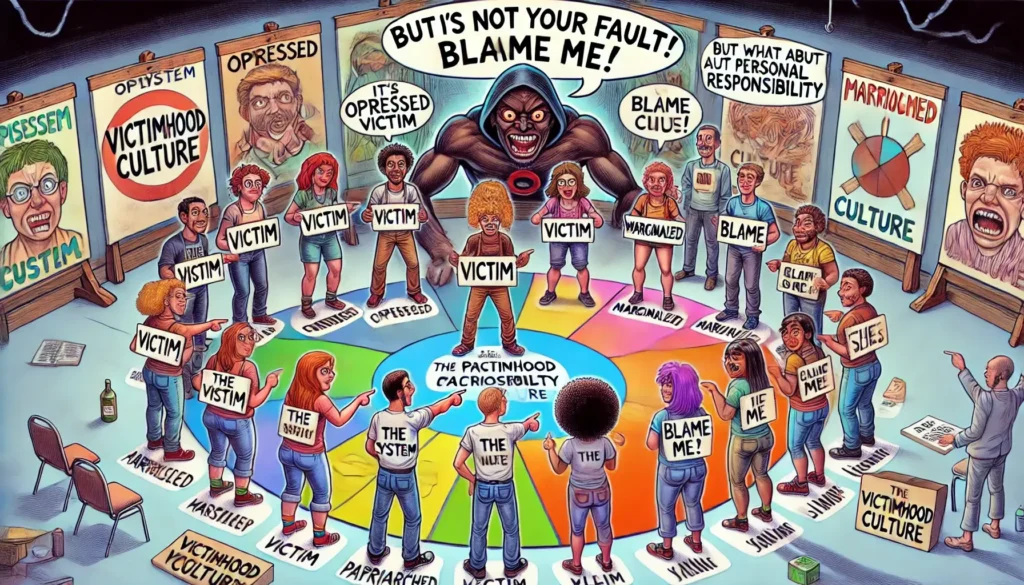The Cult of Victimhood: How Power Rewards Suffering
When Suffering Becomes Status
In today’s culture, victimhood isn’t just unfortunate — it’s rewarded. Once upon a time, strength was admired. Now, being wronged gives you moral authority, political leverage, and sometimes even career opportunities. The system we live in doesn’t just sympathise with victims; it manufactures them.
Victimhood has become currency. The more grievances you can claim, the more credibility you gain. And the system — from academia to activism, corporations to politics — thrives on it.
Table of contents
The Theory: Oppressors vs. Oppressed
The roots lie in Critical Theory, with its obsession with binaries: oppressors and oppressed. Society is recast as a constant struggle where one group always benefits at the expense of another.
Intersectionality expanded this framework, stacking identities like loyalty cards: race, gender, sexuality, disability, body size, immigration status. Each new layer = more oppression points.
The result? A hierarchy of suffering where “lived experience” trumps evidence, debate, or universal principles.
The Rewards of Victimhood
Why has victimhood become so attractive? Because it comes with real perks:
- Social Status: Victimhood brings sympathy and admiration. You’re beyond criticism, because questioning you is “punching down.”
- Media Amplification: Outrage spreads faster than facts. Personal stories of suffering go viral, even if the details don’t add up.
- Corporate Support: HR departments reward victim claims with policies, trainings, and special protections. “Equity pledges” exist to showcase how much a company “cares.”
- Political Leverage: Laws are increasingly shaped by identity-based lobbying, where claiming victimhood gives your group a louder voice.
In short: victimhood pays.
The Anger Industry
Victimhood doesn’t just exist — it’s cultivated. Whole industries depend on it:
- Academia produces the theories that redefine normal life as oppression.
- NGOs and activists package every cause as “justice” to keep donations flowing.
- Social media rewards outrage with clicks, followers, and influence.
- Politicians turn grievances into legislation, promising protection for every newly recognised victim group.
The cycle feeds itself: the more anger is manufactured, the more power flows to those managing it.
The Costs of Victimhood Culture
But there’s a catch. A society obsessed with victimhood pays a high price:
- Division: Instead of unity, every group fights for its place in the oppression Olympics.
- Resentment: Ordinary people see double standards and grow cynical about “justice.”
- Loss of Universal Principles: Equality under the law is replaced with endless carve-outs for select groups.
- Permanent Grievance: Problems are never solved, because solving them would kill the business model.
The irony? By elevating victimhood, society traps people in it. Suffering becomes permanent because it’s profitable.
Conclusion: A Society That Can Never Heal
The cult of victimhood promises empowerment, but delivers paralysis. Instead of helping people move forward, it rewards them for staying stuck.
Power structures — from corporations to governments — prefer it this way. Victims are easier to manage than citizens. And as long as anger and grievance keep flowing, the system keeps winning.
The tragedy? By worshipping victimhood, we’ve built a society that can never heal.
FAQ: Victimhood Culture
Q: What is victimhood culture?
A system where social status and moral authority come from claiming oppression.
Q: Why is it dangerous?
Because it replaces universal rights with endless group carve-outs, fuelling division and resentment.
Q: Who benefits from it?
Activists, NGOs, corporations, and politicians who gain power, money, or legitimacy by amplifying grievances.
Q: Isn’t helping victims important?
Of course. But turning victimhood into a permanent status encourages grievance over solutions.
Q: How does Critical Theory fit in?
It created the oppressor/victim lens that drives modern identity politics and powers the outrage industry.



